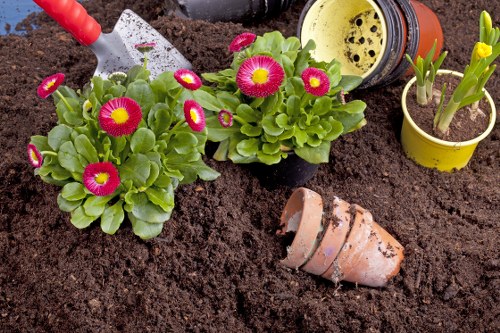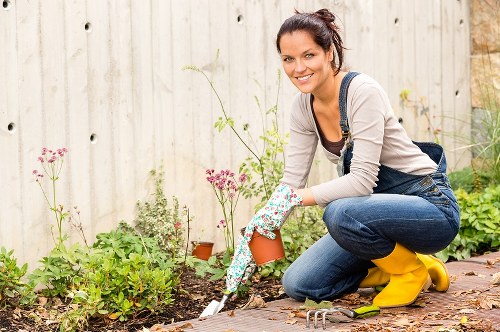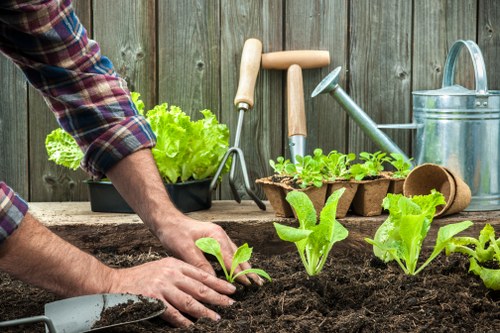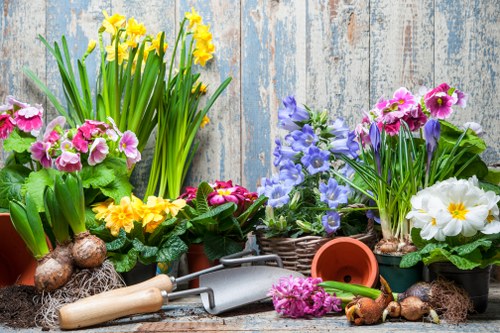Gardeners Whetstone: Cultivating Green Spaces with Care

Gardening is more than just a hobby; it's a way to connect with nature, nurture life, and create beautiful spaces. In the heart of Whetstone, a thriving community of gardeners is transforming local gardens into stunning landscapes.
Whether you're a seasoned gardener or just starting out, understanding the unique aspects of gardening in Whetstone can help you achieve the garden of your dreams. From the right tools to local climate considerations, this guide covers everything you need to know.
In this article, we'll explore the essentials of being a gardener in Whetstone, including tips, tools, and the best practices to ensure your garden flourishes.
The Importance of Gardening in Whetstone

Whetstone, known for its vibrant community and lush green spaces, provides an ideal environment for gardening. The area's temperate climate and fertile soil make it suitable for a wide variety of plants, from colorful flowers to robust vegetables.
Gardening in Whetstone not only enhances the aesthetic appeal of your property but also contributes to the local ecosystem. Gardens provide habitats for pollinators, improve air quality, and offer a peaceful retreat from the hustle and bustle of daily life.
Moreover, gardening promotes physical health and mental well-being. It offers a productive way to spend time outdoors, reduces stress, and fosters a sense of accomplishment as you watch your plants grow and thrive.
Benefits of Gardening
- Physical Health: Gardening is a great form of exercise that improves strength, flexibility, and endurance.
- Mental Health: Spending time in the garden can reduce stress, anxiety, and depression.
- Environmental Impact: Gardens support local wildlife, improve air quality, and contribute to sustainable living.
- Economic Savings: Growing your own vegetables and herbs can save money and reduce your carbon footprint.
- Community Building: Gardens can bring neighbors together, fostering a sense of community and shared purpose.
Essential Gardening Tools for Whetstone Gardeners

Having the right tools is crucial for any gardener. In Whetstone, where the growing season can be both mild and occasionally unpredictable, investing in quality gardening tools ensures that your garden remains healthy and vibrant throughout the year.
Here are some must-have tools for gardeners in Whetstone:
1. Hand Trowel: Perfect for digging small holes, transplanting seedlings, and removing weeds.
Hand Trowel
A durable hand trowel is essential for various gardening tasks. Look for one with a comfortable grip and a sturdy blade to handle different soil types.
- Recommendations: Ergonomic designs with non-slip handles.
- Maintenance: Clean and dry after use to prevent rust.
Pruning Shears
Pruning shears help maintain the shape and health of your plants by removing dead or overgrown branches.
- Types: Bypass and anvil shears.
- Tips: Regularly sharpen blades for clean cuts.
Watering Can or Hose
Consistent watering is vital for plant health. Choose between a watering can for smaller gardens or a hose with adjustable nozzles for larger areas.
- Features: Adjustable spray patterns and long hoses for reach.
- Eco-Friendly Options: Rainwater collection systems.
Best Practices for Gardening in Whetstone

To make the most of your gardening efforts in Whetstone, it's important to follow best practices tailored to the local environment. Understanding the region's climate, soil conditions, and sunlight patterns can significantly improve your gardening success.
1. Soil Preparation: Healthy soil is the foundation of a thriving garden. Test your soil's pH level and nutrient content, and amend it as necessary with compost or other organic matter.
2. Plant Selection: Choose plants that are well-suited to Whetstone's climate. Native plants often require less maintenance and are more resistant to local pests and diseases.
Soil Preparation
Start by removing weeds and debris from your garden beds. Incorporate compost to improve soil structure, fertility, and drainage. Regularly add organic matter to maintain soil health.
Choosing the Right Plants
Select plants that thrive in the local climate and soil conditions. Consider factors like sunlight, water requirements, and hardiness when selecting your garden plants.
- Flowering Plants: Roses, tulips, and lavender.
- Vegetables: Tomatoes, lettuce, and carrots.
- Herbs: Basil, rosemary, and mint.
Watering Techniques
Proper watering is essential for plant health. Water early in the morning to reduce evaporation and allow plants to absorb moisture before the heat of the day.
- Drip Irrigation: Efficiently delivers water directly to the plant roots.
- Mulching: Helps retain soil moisture and regulate temperature.
Local Relevance: Gardens Around Whetstone

Whetstone is surrounded by several charming areas, each offering unique features for gardeners. Here are some of the closest areas to Whetstone that are popular among gardening enthusiasts:
- Arnos Grove: Known for its large parks and community gardens, Arnos Grove offers plenty of space for outdoor activities.
- Totteridge: This area boasts picturesque landscapes and a variety of plant nurseries.
- East Barnet: Home to historical gardens and green spaces perfect for leisurely gardening.
- New Barnet: Offers modern gardening facilities and workshops for all skill levels.
- Burnt Oak: Features wide open spaces ideal for experimentation and large garden projects.
- Friern Barnet: Known for its community-driven garden projects and green initiatives.
- Monken Hadley: Offers a serene environment with plenty of native plant varieties.
- Wood Green: Provides access to extensive garden centers and botanical gardens.
- East Finchley: Features a mix of traditional and contemporary gardening styles.
- Finchley Central: Close to several public gardens and horticultural societies.
- Mill Hill: Known for its organic gardens and sustainable gardening practices.
- High Barnet Offers beautiful garden trails and educational gardening programs.
- Hadley Wood: Famous for its lush gardens and premium plant nurseries.
- West Finchley A hotspot for urban gardeners and small-space gardening solutions.
- East Finchley Supports a vibrant gardening community with regular events and workshops.
Common Gardening Challenges in Whetstone
While gardening in Whetstone offers many rewards, it also comes with its own set of challenges. Being aware of these can help you prepare and mitigate potential issues.
Pest Control: Common pests such as aphids, slugs, and caterpillars can damage your plants. Implementing natural pest control methods can keep your garden healthy without harming beneficial insects.
Weather Variability: Sudden changes in weather, including unexpected frosts or heavy rains, can affect plant growth. Selecting resilient plant varieties and using protective measures can help your garden withstand these variations.
Pest Control Solutions
Implement integrated pest management (IPM) techniques to control pests naturally:
- Introduce Beneficial Insects: Ladybugs and predatory beetles can help reduce pest populations.
- Use Neem Oil: An organic pesticide that is safe for most plants and animals.
- Hand-Picking: Regularly inspect your plants and remove pests manually.
Managing Weather-Related Issues
Protect your garden from extreme weather conditions by:
- Using Row Covers: Shield plants from frost and heavy rain.
- Mulching: Helps regulate soil temperature and retain moisture.
- Choosing Hardy Plant Varieties: Select plants that can withstand local weather patterns.
Sustainable Gardening Practices in Whetstone
Sustainability is an essential aspect of modern gardening. Adopting eco-friendly practices not only benefits the environment but also contributes to the long-term health of your garden.
Here are some sustainable gardening practices suitable for gardeners in Whetstone:
1. Composting: Recycle kitchen scraps and garden waste to create nutrient-rich compost for your plants.
Composting
Creating your own compost reduces waste and provides a natural fertilizer for your garden.
- What to Compost: Fruit and vegetable scraps, coffee grounds, eggshells, and yard waste.
- What to Avoid: Meat, dairy, and oily foods.
Rainwater Harvesting
Collecting rainwater provides a sustainable water source for your garden, reducing reliance on municipal water.
- Installation: Use rain barrels or tanks connected to your gutter system.
- Usage: Water your plants during dry periods or when regular watering is not feasible.
Organic Gardening
Embrace organic gardening by using natural fertilizers and avoiding synthetic pesticides.
- Benefits: Promotes healthier soil and reduces the risk of chemical runoff.
- Techniques: Crop rotation, companion planting, and using organic mulch.
Gardening Resources and Community in Whetstone
Being part of the gardening community in Whetstone provides access to valuable resources, knowledge, and support. Engaging with local gardening groups and events can enhance your gardening experience.
Here are some resources available to gardeners in Whetstone:
Local Nurseries: Offer a wide selection of plants, tools, and expert advice tailored to the Whetstone climate.
Community Gardens
Community gardens offer shared spaces where gardeners can collaborate, share tips, and enjoy collective success.
- Benefits: Access to larger plots, communal knowledge, and a sense of belonging.
- Participation: Join local gardening clubs or volunteer in community projects.
Gardening Workshops
Attend workshops to learn new techniques, discover sustainable practices, and stay updated on gardening trends.
- Topics: Organic gardening, composting, pest control, and landscape design.
- Locations: Local community centers, nurseries, and online platforms.
Online Forums and Groups
Join online communities to connect with other gardeners, ask questions, and share your gardening journey.
- Popular Platforms: Facebook groups, gardening forums, and social media pages dedicated to Whetstone gardening.
- Benefits: Instant support, diverse ideas, and a platform to showcase your garden.
Conclusion: Embrace Gardening in Whetstone
Gardening in Whetstone is a rewarding endeavor that combines beauty, sustainability, and community. By understanding the local environment, investing in the right tools, and adopting best practices, you can create a thriving garden that enhances your life and the surrounding area.
Whether you're cultivating a small balcony garden or managing a sprawling backyard, the principles outlined in this guide will help you nurture green spaces with care and passion.
Join the vibrant gardening community in Whetstone and watch your garden flourish.
Frequently Asked Questions
1. What are the best plants for beginners in Whetstone?
For beginners, it's best to start with hardy plants that are easy to maintain. Consider planting herbs like basil and mint, vegetables such as tomatoes and lettuce, and flowers like marigolds and sunflowers.
2. How can I improve soil quality in my Whetstone garden?
Improving soil quality can be achieved by adding organic matter like compost, using mulch to retain moisture, and practicing crop rotation to prevent nutrient depletion.
3. What are some natural ways to control pests in my garden?
Natural pest control methods include introducing beneficial insects like ladybugs, using neem oil as an organic pesticide, and manually removing pests from your plants.
4. How often should I water my garden in Whetstone?
Watering frequency depends on the season and specific plant needs. Generally, water deeply once or twice a week, ensuring the soil remains moist but not waterlogged. Early morning watering is ideal.
5. Where can I find gardening workshops in Whetstone?
Gardening workshops can be found at local nurseries, community centers, and online platforms. Check with the Whetstone community garden or local horticultural societies for upcoming events and classes.


